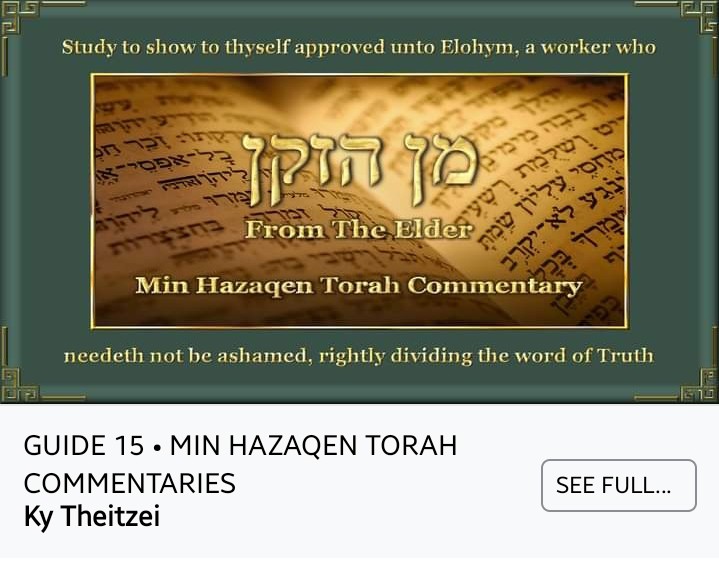Watch
Events
Articles
Market
More
Sabbath Keepers Fellowship & Prison Ministry
Ovadyah Ben Yisrael
Shalom Chaverym;
This week’s parasha is: Ky Theitzei – כִּֽי־תֵצֵא –
“When you go”
Torah reading:
D’varym 21:10-25:19
Haftarah reading:
Yeshayahu 54:1-10
Ketuvym Hatalmidym reading:
Ephesians 5:22-33
Shalom aleykhem, achym, b’shem YHWH Adon Haselicoth
~ Peace to you, my brothers, in the name of YHWH, Master of Forgiveness.
V’achar kein tavo eileyha uv’al’tah, vahaytha l’ka l’ishah
~ “And after that thou mayest go unto her and be her husband, and she shall be to thee for a wife.”
When the people of Yisrael entered the land of Kana’an to possess it, all of its inhabitants were to be put “under the ban” and killed – men, women, and children – to cleanse the land of its horrible abominations.
However, when Yisrael went to war and conquered a people outside the borders of Kana’an, the young women and property of those conquered were allowed to be taken as spoils of war.
A man in possession of a captive woman, a virgin whom he found desirable, was allowed to take her for a wife.
She was given a month to mourn her losses, and then her new husband could go in to her.
By today’s standards, this would be a horrible abrogation of the young woman’s human rights.
But, in ancient times, it was the best possible life she could hope for.
Was it then forced marriage?
Yes, of a sort, but she did have other choices available to her:
She could have instead chosen death or slavery – or she could have tried to run away, which would have probably resulted in either death or slavery at someone else’s hands.
And anyway, it was likely that her entire family had been killed in battle and she would have had nowhere left to run to.
This was also the situation the people of Yisrael found themselves in after the exodus from Mitzrayim.
YHWH had done battle with the army of Pharaoh and prevailed, then led the people of Yisrael into the wilderness where He made a proposal to them.
Their choices were essentially the same:
They could have joined themselves to YHWH (in marriage), or they could have stayed in Mitzrayim as slaves, or they could have taken their chances on their own – the latter choices would have separated them from YHWH – which, in short, would have been choosing death.
Life with YHWH, under His immense blessings, protections and promises, was the best possible life Yisrael could hope for.
And now, these same choices are available to us:
YHWH has come into each of our lives through Yehoshua Hamashiach and fought for us, conquering our adversaries: sin and death.
We have followed Him into the wilderness, a place removed from the world we knew, but not yet quite familiar to us as our home, where we listened to His proposal.
We have accepted and become betrothed as His future bride, saying along with the rest of Yisrael, “All that YHWH has spoken, we will do.”
However, He didn’t force this marriage upon us.
We didn’t have to accept His proposal and make that vow, but, of our own free will, we did.
Having done so, we are now committed forever and no longer have the option of turning back to slavery or quitting in death.
And we cannot run away from Him, for we have left ourselves nowhere else to go.
Yet, in truth, we have indeed tried to run away, haven’t we?
We all have turned away in sin repeatedly and betrayed YHWH.
He knows this.
All of it.
And yet still He says to us,
“‘For YHWH hath called thee as a wife forsaken and grieved in spirit; and a wife of youth, can she be rejected?
For a small moment have I forsaken thee; but with great compassion will I gather thee.
In a little wrath I hid my face from thee for a moment; But with everlasting kindness will I have compassion on thee,’ saith YHWH thy Redeemer.”
Listen, brethren:
“Thy Maker is thy Husband, YHWH Tzava’oth is His name.”
Return to Him and He will return to you.
With your Husband is where you belong, and it really is the best possible life you can hope for.
In truth, there is truly nowhere else left for you to go.
B’shalom, Ovadyah



